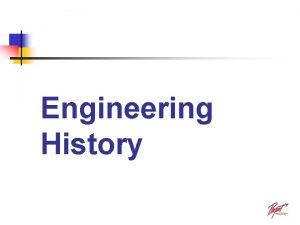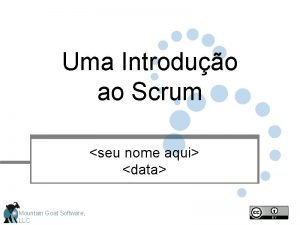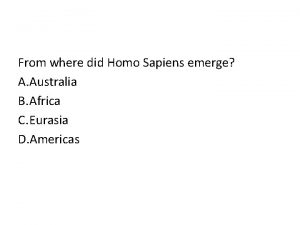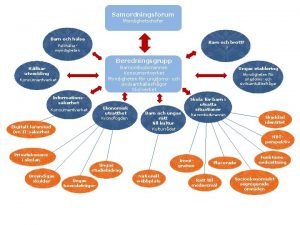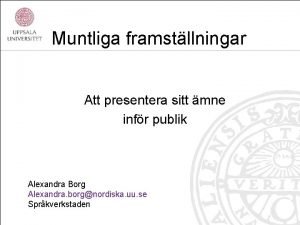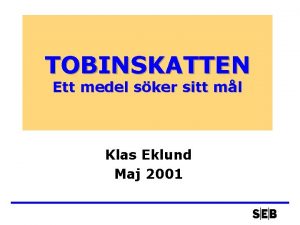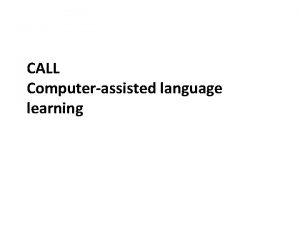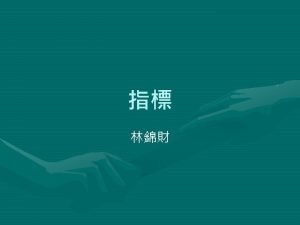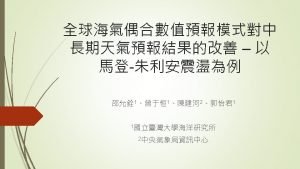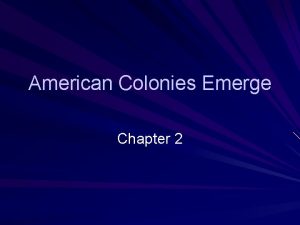THE EMERGE OF CALL CALL CALL stands for

















- Slides: 17

THE EMERGE OF CALL

CALL • CALL stands for computer-assisted language learning • CALL constantly change because of technological innovations • CALL is a subject that tied tightly to other areas of study within applied linguistics such as autonomy and other branches of knowledge such as computer science • CALL is a young branch of applied linguistics and still establishing its directions.

CALL • Any process in which a learner uses a computer and as a result, improve his or her language. • An awareness of this allows learners, teachers and researches to recognize appropriate materials and methodologies and adapt others to various teaching and learning styles.

CALL • Materials for CALL can include those which are purpose-made for language learning, and those which adapt existing computer-based materials, video and other materials. • CALL can be used in the classroom as a reward for a better learners or a remedial aid for weaker ones.

CALL • • • Terms in CALL (page 9 to 10) CAI CALI CALT CAT CBT CMC CMI ICALL TELL WELL

M. M Kenning and MJ Kenning • Talks about the early benefit of providing autonomous learning style materials: • Benefits of privacy and individualization • Each students can use the computer to review the grammar at his own speed with special emphasis on areas where he is weak • And a few later, the computer can correct mistake privately and repeatedly without the aggravation that sometimes accompanies such public correction.

CALL • Autonomy is fostered by CALL in different ways. Call can present opportunities for learners to study on their own, independent of a teacher • CALL offers opportunities for learners to direct their own learning. • CALL materials, regardless of their design, allow for endless revisiting that can help learners review those parts for which they need more practice

Technology driving CALL • In the last four decades, Call materials have gone from an emphasis on basic textual gap-filling tasks and simple programming exercise to interactive multimedia presentations with sound, animation and full-motion video.

Technology driving CALL • Barrier in CALL : • Materials designers are often either teachers with limited technical skills or competent technicians with no experience in teaching • Software authoring programs often include simple ways to create gapfilling exercises that are seductively easy to use

CALL barries • CALL materials is the lack of ways to monitor and correct unpredictable student answers. • Example : in a sentence in which the keyword answers were designed as talking and phone, the computer would : • Overlook incorrect syntax (*Talking he telephone on) • Be confused by variations in grammar (He talks on the telephone) • Fail to accept synonyms ( The man is speaking on the phone) • Fail to notice erroneous and extraneous words (*She is be talking and waiting on the telephone thing). • THE SOLUTION : to have learners emails or otherwise save answers for teachers who then mark them by hand

Technology driving CALL • Many brave attempts have been made to have the computer teach writing, but the failure of such system is always rooted in the computer inability to accommodate unpredictable learner output.

J. Murray on the limitations of natural-language processing • Such pattern-matching programs have severe limitations. For machines to understand produce language, they must be able to process natural language at the morpho-syntactic, semantic and discourse levels. For spoken language, the system also needs to process language at the phonetic and phonological level.

The Changing Focus of Research in CALL • C. M. Neuwirth and D. S. Kaufer on the dominant pattern of research in CALL “ • “Thus far, the dominant pattern of (research) in computers and compositions studies has involved empirical questions about existing software – asking for example, Do word processors improve writing quality or revision performance? – usually by experimental comparison to some traditional technology for writing such as pen and paper

The Changing Focus of Research in CALL • Research in early years focus on whether or not computers should be used in the classroom for the learning of languages – is no longer pertinent. Computer appears to stay. • The presence of computers in educational contexts has grown from a single unit in one or more classroom to computer labs and even to widespread individual ownership by students in some countries.

The Changing Focus of Research in CALL • Research is now directed into how computers should be used and what purposes but a major challenge to many studies in CALL remains a lack of empirical research. • Meich, Nave and Mosteller (1996) in an examination of 22 empirical CALL studies conducted between 1989 and 1994 concluded that CALL can ‘… substantially improve achievements as compared with traditional instruction’

The Changing Focus of Research in CALL • Longan (1995) explores the importance of computer literacy. • He suggests that computers represent the fifth in a series of languages which humans have mastered, the previous four being speech, writing, mathematics and science. • He also suggests that a failure to recognize computers as a new language has led to the inappropriate teaching and uses of computers.

The Changing Focus of Research in CALL • Such studies inevitably ignore the special features of computer’s organization and presentation of information, particularly learner centered opportunities to explore different links ( or paths of inquiry) and the appropriateness of multimedia models for accommodating different learner’s learning styles and even gender.
 New nations emerge section 2 quiz
New nations emerge section 2 quiz First engineer in history
First engineer in history Product owner
Product owner The american colonies emerge
The american colonies emerge Why did labor unions emerge
Why did labor unions emerge Torah is the sacred book of
Torah is the sacred book of Mature industry
Mature industry Te pou o te whakaaro nui
Te pou o te whakaaro nui Myndigheten för delaktighet
Myndigheten för delaktighet Presentera för publik crossboss
Presentera för publik crossboss Formuö
Formuö Klassificeringsstruktur för kommunala verksamheter
Klassificeringsstruktur för kommunala verksamheter Tack för att ni lyssnade
Tack för att ni lyssnade Debattartikel mall
Debattartikel mall Kung som dog 1611
Kung som dog 1611 Tobinskatten för och nackdelar
Tobinskatten för och nackdelar Hur ser ett referat ut
Hur ser ett referat ut Vad är vanlig celldelning
Vad är vanlig celldelning

